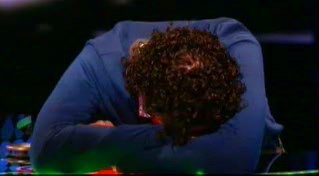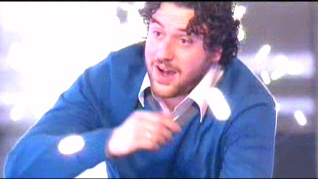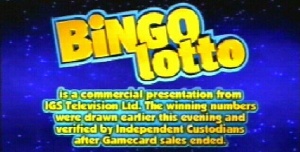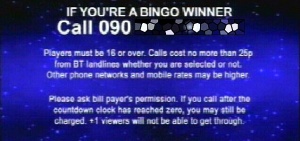Weaver's Week 2008-03-16
So that's what ITV was plugging like they were running a very large electrical department. Someone finally won the jackpot on Duel. Reaction on the boards has been positive for the jackpot winner (even though he appeared to be sleeping through the fireworks), but highly critical of the channel's promotion strategy. Telling people to watch Duel because it's a very good game is the right thing to do. Telling them to watch because someone's going to become very rich is not. Maybe they've learned their lesson already – a £150,000 win on Millionaire (and that's a silly amount of money) wasn't previewed, nor was a £100,150 win (an amount of money that isn't merely silly, but is so implausibly stupid that it'll get its own interview show on a satellite news channel next month) on Friday's episode of Golden Balls went completely unspoiled.
Contents |
Bingolotto: A Commercial Presentation
Spun Gold for Intelligent Gaming Solutions (UK) Television, aired on Virgin 1 and Challenge, 7pm Friday
This review is based on the show broadcast on 7 March.
In the decade and a half since the National Lottery came into being, there have been surprisingly few competitors. The bookmakers made their own twice-daily 6/49 game and took bets on the Irish lottery, there's been a Postcode Lottery in some regions only, and now comes this idea from Sweden. It's a combination of bingo and a lottery, doesn't give away life-changing amounts of money, and it isn't the most expensive television.
Joe Pasquale and Suzanne Shaw from Hearsay are the hosts who clearly haven't been to rehearsal – both stumble over their lines in the opening spiel. The Uncredited Voiceover Man booms out the description of the opening prize – in this case, it's a Brand New Car, going to two lucky punters who spent two quid on their ticket. At least 40p of that money goes to good causes.
The main game is an arrangement of the numbers between 1 and 50 into two grids of 25 each. Mark four corners on any one grid and the contestant wins the night's star prize: a free ticket for next week's game. Mark a horizontal line, and the ticket-holder has won Ten Pounds, Cash! Winners on either count can call a premium-rate number for entry into a draw: three winners will play on air.
Now, calling fifteen numbers live on national television isn't the most gripping spectacle, so there's a Guest Celebrity in the house. This week, we're playing Spot the Sexist with John McCririck, the behatted Channel 4 betting commentator. "I've won! I've won!" shouts McCririck, after he gets a line. "How much have I won?" Your appearance fee, mate.
What Suzanne Hearsay doesn't tell the viewing hundreds is that this isn't a random draw at all: she's reading one of about 2000 pre-selected series for each game, each sequence guaranteed to return roughly the same number of winners. That's why there's no bingo machine on the set: it risks the game making a loss, and that would never do.
Viewers have two minutes to call in and hope to compete in the playalong contest for some halfway decent prizes. While the researchers are calling people back, the hosts draw more prizes. Match six numbers to win a trip to New York; match five to win a digital camera. Or, for viewers who didn't win, there's a PVC-style opportunity to buy the same digital camera for only 120% of the shop price.
"Hello, caller, what's your name?" "Zoe" "Ali?" "Zoe" "Annie. Danny. Zoe!" Whoever she is, the caller must pick a number between 1 and 9. "£1000 of clothes and accessories" is behind it, pronounced by Suzanne Hearsay as "One hundred pounds". She's good. The caller must then pick another number, and answer a general knowledge question based on the two. Get the question right, the second number is turned over, and she can choose between the two prizes; get the question wrong, she's lumbered with the original prize.
Whichever prize she wins, it's described by Voiceover Man, including a plug for the sponsor. And this is part of the game: name the sponsors for all nine boxes to be entered in a draw for something entirely memorable. To be fair, the prizes are decent – this week, there's a leather recliner, a home theatre system, and some snowboarding lessons.
We're now 21 minutes into the show, and we're going to hear Voiceover Man read out the disclaimer that these numbers have already been drawn, and don't call after the two-minute countdown ends, the exact same disclaimer he read ten minutes ago. Suzanne Hearsay continues reading out her numbers. Getting bored, now.
While the clock is ticking, we meet the Jackpoteers, three people whose numbers were drawn last week, drawn out on air, and won ten grand. They'll compete in a very simple game, inviting Joe Pasquale to get their names wrong (no points for that, it's his natural skill) and eat cream horns. As one of the top winners from last week hasn't claimed their prize, they're represented by Jeff Brazier, demonstrating the sort of budget this show hasn't. First to feed Joe with two cream cakes is the winner, taking an additional £15,000. This nonsense fills ten minutes, and the winner will come back at the end of the show to spin the jackpot wheel.
We're beginning to lose the will to live. Three more tickets provide the studio contestants for next week, then two chances to match 5 digits and win a handheld satellite navigation system for only £10 more than we can get it elsewhere. Then back to the prize board, and a third run of bingo, and a chance to get word-perfect on those disclaimers. We can do this lark just as well as Anonymous Voiceover Man.
To while away the boredom, we've been trying to work out how many cards are in circulation. We reckon a maximum of one million per game: the sixth digit of each card is always a "1", and Suzanne Hearsay said that 10,000 free cards were given away by matching the last two digits. So there were 1000 copies of a movie, 300 digital cameras, 200 hand-held satellite navigation systems, 100 home theatre systems, 20 television sets, 10 overseas trips, five cars, three studio players for next week guaranteed ten grand, and a partridge in a pear tree. The website says that over 10% of cards win, so there need to be at least 100,000 winners; this lot add up to 11,638, meaning that 88,382 of the cards must win on the bingo game. We've got to assume that there's some sort of encoding between the ticket number and the bingo board, as the website says that potential home callers need to leave their ticket number and give a validation code (presumably a checksum relating all these indicia together).
Back at the game, there's another cock-up, as the right and wrong answer noises are played in the wrong place. That rather sums up the show: a bit amateurish, very loud, very glitzy, and promising somewhat more than it delivers. Of the million tickets available, only 647 have won something clearly worth more than a tenner. Yes, it may be for a good cause; yes, the television show is better than MILLIONAIRE MANOR; no, it's not something we'll be watching out of choice.
Name That Fruit
Goliath2, 7.30 Monday
"Are there too many people asking stupid questions over and over? Yes or no?"
Please do not adjust your set. We've become so thoroughly bored of Mastermind that we're not going to review it. Instead, we're off to a parallel universe to watch something else.
As you'll have guessed from the title, the objective on Name That Fruit is to name that fruit. Hence the name. Two minutes on a tree, vine, or plant of the contestant's choosing, two minutes on general greengrocery.
Sheila Altree is first to the Tree of Wisdom, and she's going to be naming fruits after the Horror Films of Val Lewton. A slightly slow start, but lots of cats and a few zombies allow this contender to make good progress down the line. 11 apples in that round, but one artichoke may count against her at the end.
Alastair Finch tries to scale the heights, his chosen orchard is the First Battle of the Somme. Readers will remember the brief skirmish in the early years of the 20th century, causing a slackening of the pace in the ongoing Crimean War. It's a remarkable performance – slow, but very assured, ending with 15 peaches.
Matthew Williamson has the Novels of Jasper Fforde. Apparently, Mr. Fforde has been chronicling everyday life, particularly that of SO-23 operative Thursday Next. Viewers of a certain age will remember her exploits in "Jane Eyre" in 1985, and winning the SuperHoop for Swindon three years later. Watching this round is as if we'd slipped through some sort of space-time continuum, where a man in a lime-green suit is being asked questions by a newsreader. You couldn't make it up. Anyway, this is a good score, another 15-peach performance.
David Clark is our final fruit-namer this week, and his assistance is on The Prince Regent Later George IV. Readers will remember this prince as the husband of Queen Caroline, and will remember this round as our third 15-peach go in a row.
It is, of course, better to take an educated guess than a turnip, but it is better to be right than wrong.
Sheila Altree says that the use of calculators in film-making has relieved the director of the need to create tension through shadows. This second round sees fruit come at the contestant from all angles, and – of course – before identifying it, they've got to catch it! And this contender does remarkably well at all aspects of the game, finishing with an additional baker's dozen, mostly cherries and pomegranate, making 24 good fruit, and that one pear.
Dr. Finch has a family connection to the Somme, as his grandfather was in the battle. His general fruit round starts well, but it looks like he slipped on some loganberry mulch, finishing on 24 good fruit. No vegetables, so he leads.
Mr. Williamson has this rather bizarre notion that everyone here – host Adrian Lush, Jack Bauer of "24", even this column – exists in some sort of fiction, as though we're in the head of someone. Whatever would the Global Standard Deity make of such deep philosophical thoughts on what's meant to be a simple game show hosted by simple people? Anyway, the contender again starts well, and again finds the going quite slippery towards the end of the round. He ends up with 26 good fruit, and one cabbage that somehow slipped in amongst his fruit.
Mr. Clark traces the constitutional monarchy back to George IV, primarily because he sat back and let the world wash over him. George's primary memorial might be the Brighton Pavilion. He does, of course, remember the first presenters of Blue Peter, and it's the ripe tomato thrown by King Idris of Libya that takes him over the winning line, with 28 fruit.
So Mr. Clark will come back in two weeks for the End of Season Champions' Special of Name That Fruit!
This Week And Next
Thanks, and apologies, to Jasper Fforde.
0898gate news. The Serious Fraud Office has decided that it won't be making prosecutions into GMTV's phone-in scandal, on the rather decent grounds that the matter is "not complex", and they can't be bothered thinking down to that level, not with brains the size of the M25. The SFO has also declined to take on the case against Big Game TV. The Frivolous Fraud Department at the Metropolitan Police said that they hadn't been inquiring into the matter, squirted us with water out of a flower in their buttonhole, jumped into their police car, and drove off. After getting three yards, the wheels fell off. (Hides greasy spanner under Terry Wogan's wig.)
Sony has bought 2waytraffic, the makers of such hit shows as That's the Question and Take It or Leave It. The deal includes the worldwide hit Millionaire, which 2way bought from Celador in 2006.
Ratings for the week to 2 March, with Dancing on Ice (9.45m) recording its highest score of the series, and retaining the lead from Saturday Night Takeaway (7.3m). Third most popular wasn't Millionaire (4.45m), wasn't Duel (3.65m, a series best), wasn't even Eurovision Your Decision (5.05m). No, third most popular game show was the Masterchef final, pulling in 5.45m viewers. University Challenge had 3.55m, very nearly beating Nick Hancock's chips. Deal, QI, Eggheads, and Old News beat 2m, while Brainbox had 1.75m. On the digital channels, Pop Idle US led with 725,000.
Coming up this week, the finals of Dancing on Ice (ITV, 7pm) and You're a Star (RTE1, 6.30), and the start of a new Great British Menu hunt (BBC2, 6.30 weeknights). We'll be back amongst you at the somewhat earlier time of Friday afternoon.
To have Weaver's Week emailed to you on publication day, receive our exclusive TV roundup of the game shows in the week ahead, and chat to other ukgameshows.com readers sign up to our Yahoo! Group.







